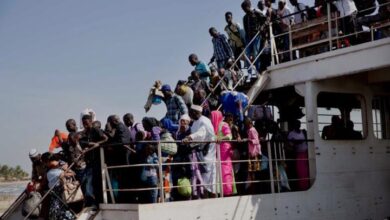By the Side of the Road… Sanitation Workers Protest, Demanding Their Rights

In painful silence, far from the glare of cameras and the noise of conferences, more than 900 sanitation workers in the capital Nouakchott stand by the roadside—not to clean it as they usually do, but to seek a glimmer of hope after being left without work, without rights, and without even official recognition of their suffering.
These workers, who have devoted years of their lives to serving the city, suddenly found themselves sidelined after the authorities, represented by the Ministry of Interior and Decentralization, awarded the sanitation contract to a new Moroccan company—without any guarantees for the continuation of the previous workers or protection of their basic rights.
A Contract Without Conscience?
Awarding the contract to a foreign company is not the issue in itself; external cooperation can be a legitimate choice to improve performance. But what causes astonishment—and resentment—is that the signed contract completely ignored the fate of the Mauritanian workers and contained no clause requiring the new company to absorb or compensate them.
The painful irony is that even their end-of-service benefits from the previous company have not yet been paid, as if years of effort and sacrifice can be erased with a stroke of a pen.
Who Bears Responsibility?
In such cases, the direct political responsibility of the Minister of Interior, Mohamed Ahmed Ould Mohamed Al-Amin (Ould Howaireth), cannot be overlooked. He is supposed to be the guarantor of social justice and the protector of the public interest—not just a signatory on contracts.
It was his duty—as many observers see it—to require in the new contract the protection of workers’ rights or at least guarantee their compensation for job loss. Have corporate interests become more important than citizens’ rights?
The Silent Human Dimension
Behind every worker removed from his job is a family waiting for a livelihood, children being forced out of schools, and women waiting for monthly support. These workers are not mere numbers in an employment record; they are the lifeblood of vulnerable segments of society.
This issue is not just about cleaning the streets—it is about the cleanliness of public conscience and the ethical responsibility of the state.
Is There Hope?
Voices demanding justice for these workers grow louder, calling for a transparent investigation into the background of the new contract and for restoring the rights of the working class, who often bear the brunt of hasty policies and narrow interests.
Solidarity with sanitation workers is not mere fleeting sympathy—it is a principled stance reflecting the kind of society we want: a society that does not marginalize the weak or sell the dignity of its citizens in the auctions of contracts.
In painful silence, far from the glare of cameras and the noise of conferences, more than 900 sanitation workers in the capital Nouakchott stand by the roadside—not to clean it as they usually do, but to seek a glimmer of hope after being left without work, without rights, and without even official recognition of their suffering.
These workers, who have devoted years of their lives to serving the city, suddenly found themselves sidelined after the authorities, represented by the Ministry of Interior and Decentralization, awarded the sanitation contract to a new Moroccan company—without any guarantees for the continuation of the previous workers or protection of their basic rights.
A Contract Without Conscience?
Awarding the contract to a foreign company is not the issue in itself; external cooperation can be a legitimate choice to improve performance. But what causes astonishment—and resentment—is that the signed contract completely ignored the fate of the Mauritanian workers and contained no clause requiring the new company to absorb or compensate them.
The painful irony is that even their end-of-service benefits from the previous company have not yet been paid, as if years of effort and sacrifice can be erased with a stroke of a pen.
Who Bears Responsibility?
In such cases, the direct political responsibility of the Minister of Interior, Mohamed Ahmed Ould Mohamed Al-Amin (Ould Howaireth), cannot be overlooked. He is supposed to be the guarantor of social justice and the protector of the public interest—not just a signatory on contracts.
It was his duty—as many observers see it—to require in the new contract the protection of workers’ rights or at least guarantee their compensation for job loss. Have corporate interests become more important than citizens’ rights?
The Silent Human Dimension
Behind every worker removed from his job is a family waiting for a livelihood, children being forced out of schools, and women waiting for monthly support. These workers are not mere numbers in an employment record; they are the lifeblood of vulnerable segments of society.
This issue is not just about cleaning the streets—it is about the cleanliness of public conscience and the ethical responsibility of the state.
Is There Hope?
Voices demanding justice for these workers grow louder, calling for a transparent investigation into the background of the new contract and for restoring the rights of the working class, who often bear the brunt of hasty policies and narrow interests.
Solidarity with sanitation workers is not mere fleeting sympathy—it is a principled stance reflecting the kind of society we want: a society that does not marginalize the weak or sell the dignity of its citizens in the auctions of contracts.









